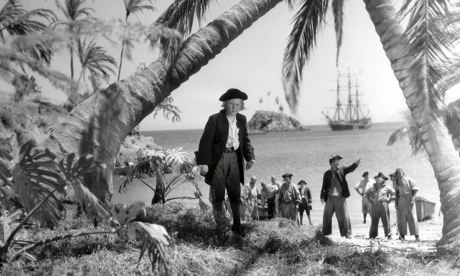Empire adventure stories, bestsellers in their day, are rarely looked at now – a sign, argues Miranda Carter, of how Britain ignores its imperial history. It's time readers and writers tackled the subject head-on

The 1934 film adaptation of Treasure Island. Courtesy of the Everett Collection/Rex
Adventure stories set in the British empire are now so unfashionable they don't even have a name, even though they are a distinct genre. They also form a significant part of our literary history and, in their time, some of the best were both wildly popular and, in more than one sense, trailblazers.
Robinson Crusoe, published in 1719, has a strong claim to being the first real novel in English as well as the first colonial adventure story. RL Stevenson's Treasure Island, and H Rider Haggard's King Solomon's Mines – both published in the 1880s when the genre really took off – have some claim, as Giles Foden has argued in these pages, to being the first literary blockbusters. The colonial adventure genre encompassed hundreds of books, from Kipling's Indian writing, above all Kim, the masterpiece of Anglo-Indian literature, to GA Henty's Boy's Own potboilers, AEW Mason's The Four Feathers, Edgar Wallace's Sanders of the River and Talbot Mundy's King of the Khyber Rifles.
These stories told big, primal tales from the frontier, or what Arthur Conan Doyle called in The Lost World, "the big blank spaces in the map". They provided a vast, exotic, canvas, far from increasingly safe and conventional Britain, on which to recast old familiar plots: quests, struggles with evil, tests of strength, exciting encounters with the unfamiliar. Their protagonists were tested and came through. An energetic plot was vital – it is no accident that many of the most famous have spawned multiple film versions.
The books fed the imaginations of western readers who would likely never see Africa, Asia or the Pacific – and yet felt that through these stories they had a connection with them. Robinson Crusoe seduces with its vivid narrative voice, its gripping plot and some of the most memorable images in fiction – most famously the discovery of Friday's footprint on the beach. Treasure Island gives us an intense sense of place, and a poignant coming-of-age story full of moral ambiguity. Kim is at once spy story, coming-of-age tale, picaresque novel, adventure and a slice of Indian society at the end of the 19th century.
More
Robinson Crusoe, published in 1719, has a strong claim to being the first real novel in English as well as the first colonial adventure story. RL Stevenson's Treasure Island, and H Rider Haggard's King Solomon's Mines – both published in the 1880s when the genre really took off – have some claim, as Giles Foden has argued in these pages, to being the first literary blockbusters. The colonial adventure genre encompassed hundreds of books, from Kipling's Indian writing, above all Kim, the masterpiece of Anglo-Indian literature, to GA Henty's Boy's Own potboilers, AEW Mason's The Four Feathers, Edgar Wallace's Sanders of the River and Talbot Mundy's King of the Khyber Rifles.
These stories told big, primal tales from the frontier, or what Arthur Conan Doyle called in The Lost World, "the big blank spaces in the map". They provided a vast, exotic, canvas, far from increasingly safe and conventional Britain, on which to recast old familiar plots: quests, struggles with evil, tests of strength, exciting encounters with the unfamiliar. Their protagonists were tested and came through. An energetic plot was vital – it is no accident that many of the most famous have spawned multiple film versions.
The books fed the imaginations of western readers who would likely never see Africa, Asia or the Pacific – and yet felt that through these stories they had a connection with them. Robinson Crusoe seduces with its vivid narrative voice, its gripping plot and some of the most memorable images in fiction – most famously the discovery of Friday's footprint on the beach. Treasure Island gives us an intense sense of place, and a poignant coming-of-age story full of moral ambiguity. Kim is at once spy story, coming-of-age tale, picaresque novel, adventure and a slice of Indian society at the end of the 19th century.
More
No comments:
Post a Comment